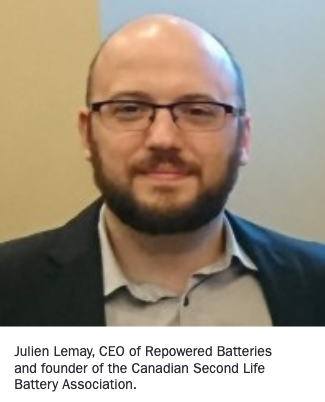(819) 329-1012
551 Castor St
Russell, ON
K4R 1E5
repoweredbatteries.ca

The second life battery industry—the reuse of electric vehicle (EV) batteries after they are done being used in the vehicle—is very young. In fact, the Canadian Second Life Battery Association (CSLBA) was founded this year only, as second life manufacturers seek to distinguish themselves from battery recyclers.
This is similar to how wreckers who reuse parts distinguish themselves from recycling yards that shred vehicles for scrap metal. The second life use of batteries is a step in the value chain for recyclers. These recyclers will get the batteries eventually as they are essential in the lifecycle of batteries.
By pushing back recycling, second life manufacturers offer a greener option, and also give recycling the time to mature before taking on all the material, leading to improved material recovery down the road.
There are two streams of batteries for second life manufacturers. The first is from vehicles being taken off the road early due to accident, recall or failure, for which the battery can be reused in cars. These batteries have more value as less work has to be put into them.
The second stream is end of life batteries, that is batteries that are no longer usable in vehicles. These batteries must go through a thorough reprocessing, and only hold a minimal residual value. This value is still better than the metal recovery option which costs the battery owner money.
One way in which second life manufacturers are different than auto recyclers, is that they must specialize their assembly lines for certain makes and sometimes even models. This specialization is costly and means that the manufacturer will usually focus on one or two makes, expanding into different lines as they grow.
For example, RePowered Batteries in Ontario and Quebec specializes in BMW and Toyota batteries, while Lithium Battery Solution, the company’s lithium site in Quebec, specializes in the use of Tesla and Kia batteries, with both having their sights set on expanding their processing lines with time.
RePowered Batteries for example reuses as much of the casing and wiring as possible. The need to preserve the cells means that disassembly must be done meticulously, which makes sorting of the different materials a natural extension of the process. In turn, the disassembly process makes proper recycling of all unused parts accessible. All batteries get reconfigured into a standard configuration which is scalable to meet the needs of their utility battery clients. The use of advanced modelling and AI battery selection allows them to provide large and durable batteries made from used premium grade cells at the cost of low-end batteries.
Lithium Battery Solution, on the other hand, currently focuses on re-using modules as they are made by the manufacturer. Their client base of vehicles (boats, RVs etc.), off-grid homes, and cottages make the module sizes in which batteries come from the factory quite attractive. Combined with their sophisticated battery management system, they too can offer a premium product.
At the end of the day, second life manufacturers can offer auto recyclers higher value than selling batteries for metal, which is generally unprofitable once shipping is factored in. The real challenge lies in creating the relationships required to know where to send which kind of battery, as well as the logistics aspect of shipping the batteries. These are both problems that can easily be surmounted through education and collaboration.
THE SECOND LIFE USE OF BATTERIES IS A STEP IN THE VALUE CHAIN FOR RECYCLERS. THESE RECYCLERS WILL GET THE BATTERIES EVENTUALLY AS THEY ARE ESSENTIAL IN THE LIFECYCLE OF BATTERIES.
© Media Matters Inc ~ All Rights Reserved